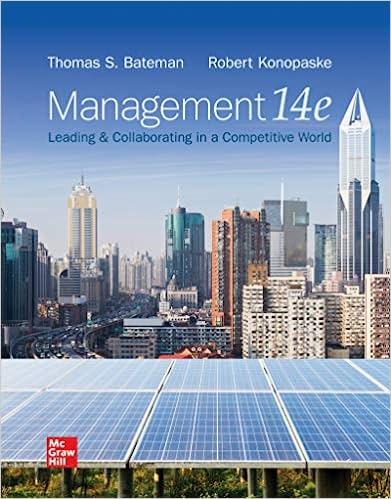Cristina Muoz and Rashid Prakash started EatWell Technologies as a result of conversations they had while graduate
Question:
Cristina Muñoz and Rashid Prakash started EatWell Technologies as a result of conversations they had while graduate students in bioengineering. Both were interested in how to develop crops offering superior nutrition in developing countries, and both believed that business innovation could and should drive social change. They focused their research on a genetically modified strain of rice that is drought tolerant and high in vitamin A and iron.
Upon completing their studies, they wrote a business plan and formed EatWell Technologies to commercialize their rice. Their aim was to sell first in Africa, where nutrition is an urgent problem and the potential for economic development presents huge opportunities for business. They selected Nigeria as their first target market.
Working through the government and with nongovernmental development organizations and local farmers, Cristina and Rashid established a reputation for integrity and reliability. As farmers began purchasing their rice, the two owners hired research assistants, office staff, and sales representatives. They began to enjoy modest profits and started paying themselves a monthly salary—far from what they could earn as scientists in a large corporation but enough to live on. They began discussing what products to offer next. Cristina suggested they develop leafy greens to provide variety in local diets; Rashid was inclined to add new strains of rice, their area of greatest knowledge.
Cristina and Rashid also realized that as their venture grew, it needed management expertise. They interviewed Victoria Jensen, a retired vice president of a community bank. Victoria was impressed with the company’s mission and thought an interesting project would be to help EatWell become financially stronger. Rashid, Cristina, and Victoria reached an agreement by which Victoria would become a third partner in exchange for investing $450,000. The partners met daily, and Victoria helped Cristina and Rashid track cash flow, choose suppliers, and meet experts who could help the business expand into new markets.
At one of their meetings, Rashid and Cristina agreed it was time to settle on the direction for product development:
Would EatWell be a rice company or should it diversify into vegetables? Victoria pointed out that rice and leafy greens are commodities, and EatWell will never get much of a return from investing in commodities. Instead, she pointed out the value of the rice as a brand. She explained her entire vision.
“Imagine where EatWell could go by incorporating the rice into other products, such as energy bars and breakfast cereal.
We could go beyond farming into the cities and sell to Africa’s rapidly growing middle class, who could pay a premium. We could even start paying ourselves salaries in line with our expertise and the risks we took by forming the company.”
Rashid and Cristina were shocked. From their viewpoint, Victoria had lost sight of the company’s purpose.
DISCUSSION QUESTIONS 1. Why do you think Rashid and Cristina feel that Victoria’s vision is not aligned with the founding principals of the company? Do you think they are correct in their assessment?
Why or why not?
2. In this case, where do you see resistance to change?
What could Victoria say, if anything, to persuade Rashid and Cristina to change their minds?
3. What advice would you give Cristina and Rashid about shaping their future?
Step by Step Answer:

Management Leading And Collaborating In A Competitive World
ISBN: 9781260261523
14th Edition
Authors: Thomas Bateman, Robert Konopaske





